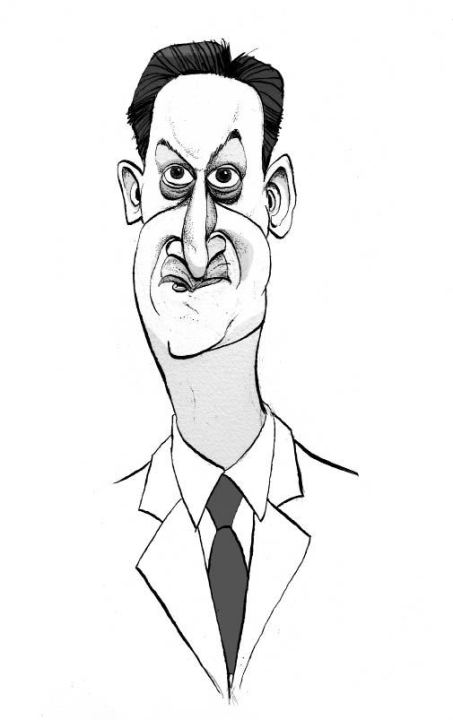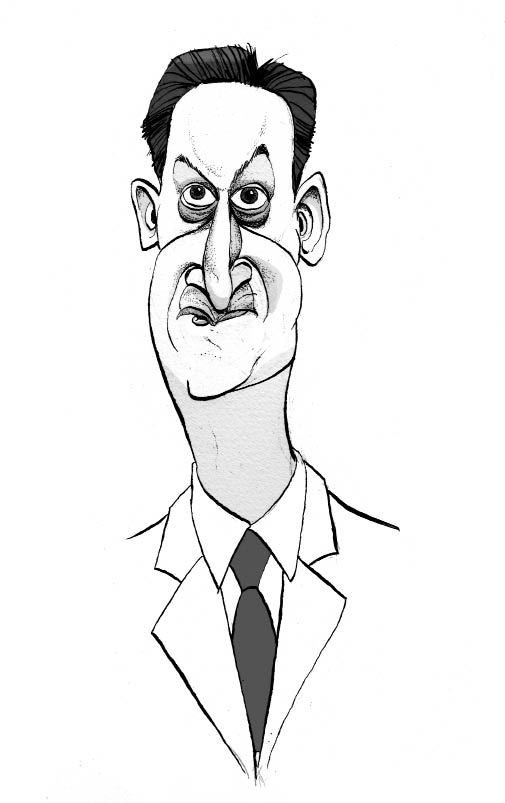James Forsyth meets Ed, the ‘normal’ Miliband, who says that the conventional political wisdom about Middle England is all wrong
When you walk into Ed Miliband’s office in the House of Commons, the first thing you’re struck by is that he has not had time to unpack since Labour lost power. It is bare except for a couple of generic-looking paintings. When I ask him what they are of, he stares at them quizzically for a second before an aide reminds him that they were left there by the previous occupant.
But the second thing that hits you is that Ed is normal, surprisingly so. As we exchange pleasantries, he doesn’t engage in any of the psychological tricks so beloved of some politicians; there’s no attempt to establish alpha-male status. He even sits himself in the low window seat in an attempt to minimise his height advantage.
Despite Ed’s relaxed nature, he has become the polarising candidate in this contest. To his supporters, Ed is the real deal, a conviction politician unembarrassed by his left-wing views — the perfect antidote to the poll-driven politicians the electorate has such contempt for. But to his critics, he’s a panderer, a man telling the Labour membership just what they want to hear.
Ed is certainly left-wing. He tells me, with a real sense of outrage, about meeting care-workers in Durham who are being paid the minimum wage for working in an old people’s home. ‘Now maybe a free market person says, you know, that’s what the market will bear for that sort of work, that’s life. Well I just don’t agree with that.’
But Ed doesn’t think his politics make him the comfort-zone candidate, a Labour William Hague. Rather, he thinks he is to Labour what David Cameron was to the Tories in 2005: ‘I think that Cameron was more willing than Davis to say look, we’ve got to change in order to win the next election. That’s the way I see myself.’
This electoral analysis is premised on the idea that the conventional wisdom about Middle England, that mythic place where elections are won and lost, is all wrong. Miliband argues that London has distorted the media’s view of it, that we forget that only 5 per cent of people in the country earn over £60,000 a year.
At this point, we have a laugh about David Cameron describing himself as middle class. But when I asked Ed what class he thinks he is, he says, ‘I’m middle class’. When I counter that he earns over £60,000, he replies that ‘politicians are slightly in a class of their own, really’.
This Miliband’s appeal to Middle England, though, is going to be about personality as much as policy. At the event where he announced that he would stand for Labour leader, young supporters surrounded him as he left carrying placards reading ‘Ed is Normal’, ‘Ed speaks human’ and the like. The implied contrast was clear: Ed isn’t odd in the way that his brother — the front- runner in this contest — is caricatured as being. Ed isn’t the kind of guy who looks over your shoulder while talking to you.
Outside of the political class, normal isn’t the adjective that would spring to mind to describe Ed. He’s the son of a Marxist academic who has either been working for a frontline politician or has been one himself for the last 16 years and is now running against his brother for the leadership of the Labour party.
But he does have an easy charm, an ability to make people like him. At the last election, his Tory opponent in Doncaster North intended to embarrass him over how little time he spent in his constituency and attack him for not doing enough for the town. By the end of it, she was writing him a letter saying that if she was a Labour member she’d vote for him in the leadership contest.
Ed is so keen not to be seen to be ‘dissing the other candidates’ that he is far less fluent on the Labour leadership race than on the other subjects we discuss. His time in America — he lived there several times in his childhood and for a year in his thirties when he studied at Harvard — has clearly influenced him. He says, almost wistfully, that ‘American politics is always fascinating because it’s bigger, more spectacular, at the centre of the world.’ He bemoans how we lack America’s sense of optimism; complaining that if the BBC was American they ‘would spend their time celebrating it, being proud of it, going on about how brilliant it is that everybody listens to the BBC World Service, talking about its civilising influence, all of those things’, but instead we, being Brits, spend our time complaining about how the BBC pays Jonathan Ross too much.
It is, though that very British thing, ‘the spirit of the blitz’, that he wants to find a way to tap into now. He talks warmly about how his father, who came here as a 16-year-old refugee from the Continent, was inspired by that spirit. ‘What we have to search for as a country is a sort of modern form of solidarity,’ he says.
When I ask him to name his heroes, he lists three sportsmen. But this is not a classic New Labour answer, since none of them are footballers and all are slightly odd choices of which a spin doctor would not approve. The first is the Yorkshire and England batsmen Geoff Boycott. It turns out that Miliband saw his 100th century at Headingly and bunked off school to see his final innings at Lord’s. The second is Jimmy Connors and the third is the snooker player Alex Higgins. As we try to work out what ties these three together, Ed suggests that it is ‘the charisma of imperfection’. It is an odd thing for a politician with such polish to admire.
An early indicator of how Ed Miliband would lead the Labour party comes in his attitude to the Liberal Democrats. The approach that meets with most approval from Labour supporters would be to attack them but not actually to shut off the option of doing a deal with them after the next election. But Ed says he wouldn’t do a deal with Clegg and he tells me that he wants them to live in fear of ‘teetering towards some kind of extinction come the next election’.
Miliband’s sallies against the Liberal Democrats show that he understands how to do opposition politics. If he did upset the odds and the birth order, he’d be adept at campaigning against the cuts, at finding the coalition’s weak points. But there is more doubt about whether he could make the transition to being a credible potential prime minister: would voters shy away from his ideological certainty and explicitly left-wing views when faced with the prospect of him in Downing Street, or could he shift the country leftwards in the same way that Margaret Thatcher sent it right? That is what the Labour selectorate has to decide between now and 25 September.








Comments